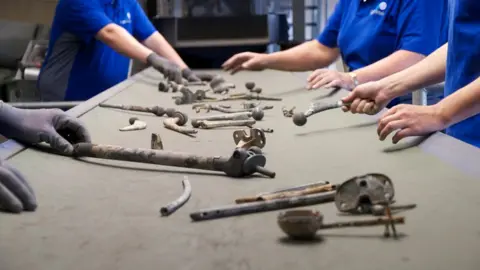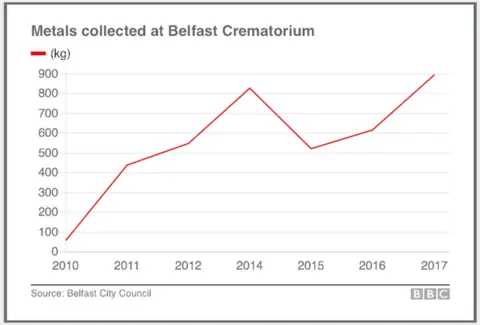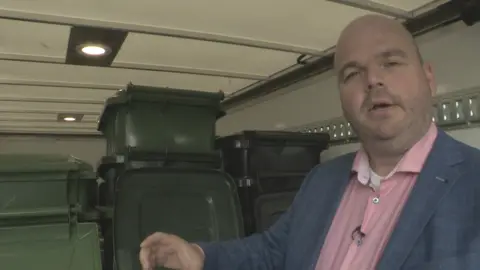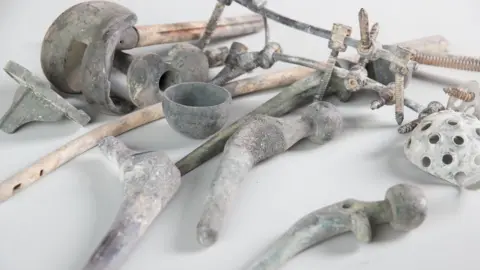The metal finding new life after cremation
Do you know what happens to jewellery, gold teeth, metal hips and coffin nails after cremation?
At Roselawn cemetery, just outside Belfast, metals left over after cremation are collected from ashes.
They are then sent to the Netherlands as part of a recycling scheme.
Figures obtained by the BBC under Freedom of Information legislation, show that almost four tonnes of metal have been collected in Northern Ireland since 2010.
That is the equivalent, in weight, of four hatchback cars collected from the ash of cremations.
The crematorium at Roselawn is one of 260 throughout the UK that takes part in the recycling scheme, carried out by Dutch company OrthoMetals.
Belfast City Council seeks written permission from bereaved families to recycle any metals which remain following cremation.

How are the metals recycled?
 Orthometals
OrthometalsMetals left over after a cremation are removed from the ashes with tongs and a magnet, before being placed in a recycling container.
The type of metals collected range from stainless steel and copper, to precious metals such as gold and palladium.
They come from jewellery, gold teeth and fillings, as well as metal hip implants and ornaments from coffins.
The materials are shipped to the Netherlands, where they are sorted and sold to foundries to be melted.
Some of the materials are sold to the aircraft, car and household industries, with some being re-used in the construction of road signs and electric cars.


Hidde Verberne, a director at OrthoMetals, was in Belfast recently as part of the company's annual collection of left-over metals at Roselawn.
The typical reaction he gets when telling people his job is "What?!" he says.
He added: "But then when people think out it they say : 'Of course it makes sense to recycle'.
"So families are made aware that this process is taking place and there is consent given through the forms provided by the crematoriums.

"It's 2018, being more green is what is accepted now.
"Sometimes it's more a case... that the public aren't always aware that this process happens, but when a bereaved family is informed with what happens with the material, in my experience most are happy for the process to take place."
But what about jewellery that people may leave on their loved ones when they get cremated - is that collected and recycled as left-over metal as well?
The short answer - yes.
But Mr Verberne said more people were choosing to remove precious items before cremation.
"After the cremation there is a separation between the ashes and the metal because you only want to give the families their loved ones' ashes so they can safely scatter them or keep them in an urn," he said.
"If jewellery is kept on during cremation, they will be separated as part of this process.
"But what we're seeing more and more of is that people are realising there is a value in precious metal material and they are asking the funeral directors to remove such items."
Metals left over after cremations at Roselawn were previously buried in landfill, before the crematorium joined the recycling scheme in 2010.
 Orthometals
OrthometalsThe Institute for Cemetery and Crematorium Management (ICCM) promotes the scheme on behalf of OrthoMetals in the UK.
It said the scheme's aim was to protect the environment by recycling the metals, with some of the profits going to charity.
After it covers its operating costs, OrthoMetals takes a percentage of the value of the metals it has collected and sold. The rest of the money is given back to the ICCM.
Crematoriums can nominate a charity to donate money.
Since the scheme began, more than £5.2m has been donated to charities and 396 different organisations have benefited from the scheme.
According to OrthoMetals, the gross value of the metals collected from Roselawn since 2014 amounted to about €78,000 (£68,783).
Belfast City Council does not receive any payment for the metals recycled, and has donated £20,000 to local charities from profits made through its participation in the recycling scheme.
Figures provided by the council show the number of people getting cremated in Northern Ireland has increased in the last decade - but so too has the cost.
Roselawn is currently the site of Northern Ireland's only crematorium, although there are plans to build a second.
Options for the planned crematorium are being jointly explored by Derry City and Strabane District Council, Fermanagh and Omagh District Council and Mid Ulster Council.
So for Hidde Verberne and OrthoMetals, business does not look like it is going to slow down any time soon.
"There are a lot of people getting cremated so therefore, there is a lot of metal," he said.
"What we're really proud of is that this material isn't being thrown away or buried. It is now recycled, so every kilo matters."
